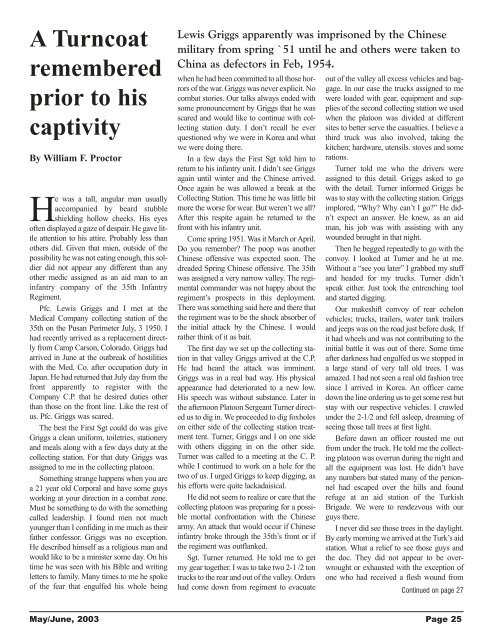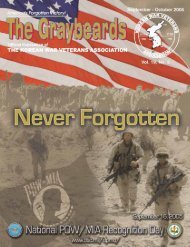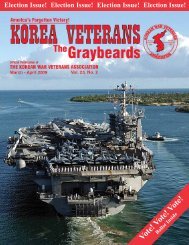The Graybeards - KWVA - Korean War Veterans Association
The Graybeards - KWVA - Korean War Veterans Association
The Graybeards - KWVA - Korean War Veterans Association
You also want an ePaper? Increase the reach of your titles
YUMPU automatically turns print PDFs into web optimized ePapers that Google loves.
A Turncoat<br />
remembered<br />
prior to his<br />
captivity<br />
By William F. Proctor<br />
He was a tall, angular man usually<br />
accompanied by beard stubble<br />
shielding hollow cheeks. His eyes<br />
often displayed a gaze of despair. He gave little<br />
attention to his attire. Probably less than<br />
others did. Given that mien, outside of the<br />
possibility he was not eating enough, this soldier<br />
did not appear any different than any<br />
other medic assigned as an aid man to an<br />
infantry company of the 35th Infantry<br />
Regiment.<br />
Pfc. Lewis Griggs and I met at the<br />
Medical Company collecting station of the<br />
35th on the Pusan Perimeter July, 3 1950. I<br />
had recently arrived as a replacement directly<br />
from Camp Carson, Colorado. Griggs had<br />
arrived in June at the outbreak of hostilities<br />
with the Med. Co. after occupation duty in<br />
Japan. He had returned that July day from the<br />
front apparently to register with the<br />
Company C.P. that he desired duties other<br />
than those on the front line. Like the rest of<br />
us. Pfc. Griggs was scared.<br />
<strong>The</strong> best the First Sgt could do was give<br />
Griggs a clean uniform, toiletries, stationery<br />
and meals along with a few days duty at the<br />
collecting station. For that duty Griggs was<br />
assigned to me in the collecting platoon.<br />
Something strange happens when you are<br />
a 21 year old Corporal and have some guys<br />
working at your direction in a combat zone.<br />
Must be something to do with the something<br />
called leadership. I found men not much<br />
younger than I confiding in me much as their<br />
father confessor. Griggs was no exception.<br />
He described himself as a religious man and<br />
would like to be a minister some day. On his<br />
time he was seen with his Bible and writing<br />
letters to family. Many times to me he spoke<br />
of the fear that engulfed his whole being<br />
Lewis Griggs apparently was imprisoned by the Chinese<br />
military from spring `51 until he and others were taken to<br />
China as defectors in Feb, 1954.<br />
when he had been committed to all those horrors<br />
of the war. Griggs was never explicit. No<br />
combat stories. Our talks always ended with<br />
some pronouncement by Griggs that he was<br />
scared and would like to continue with collecting<br />
station duty. I don’t recall he ever<br />
questioned why we were in Korea and what<br />
we were doing there.<br />
In a few days the First Sgt told him to<br />
return to his infantry unit. I didn’t see Griggs<br />
again until winter and the Chinese arrived.<br />
Once again he was allowed a break at the<br />
Collecting Station. This time he was little bit<br />
more the worse for wear. But weren’t we all?<br />
After this respite again he returned to the<br />
front with his infantry unit.<br />
Come spring 1951. Was it March or April.<br />
Do you remember? <strong>The</strong> poop was another<br />
Chinese offensive was expected soon. <strong>The</strong><br />
dreaded Spring Chinese offensive. <strong>The</strong> 35th<br />
was assigned a very narrow valley. <strong>The</strong> regimental<br />
commander was not happy about the<br />
regiment’s prospects in this deployment.<br />
<strong>The</strong>re was something said here and there that<br />
the regiment was to be the shock absorber of<br />
the initial attack by the Chinese. I would<br />
rather think of it as bait.<br />
<strong>The</strong> first day we set up the collecting station<br />
in that valley Griggs arrived at the C.P.<br />
He had heard the attack was imminent.<br />
Griggs was in a real bad way. His physical<br />
appearance had deteriorated to a new low.<br />
His speech was without substance. Later in<br />
the afternoon Platoon Sergeant Turner directed<br />
us to dig in. We proceeded to dig foxholes<br />
on either side of the collecting station treatment<br />
tent. Turner, Griggs and I on one side<br />
with others digging in on the other side.<br />
Turner was called to a meeting at the C. P.<br />
while I continued to work on a hole for the<br />
two of us. I urged Griggs to keep digging, as<br />
his efforts were quite lackadaisical.<br />
He did not seem to realize or care that the<br />
collecting platoon was preparing for a possible<br />
mortal confrontation with the Chinese<br />
army. An attack that would occur if Chinese<br />
infantry broke through the 35th’s front or if<br />
the regiment was outflanked.<br />
Sgt. Turner returned. He told me to get<br />
my gear together. I was to take two 2-1 /2 ton<br />
trucks to the rear and out of the valley. Orders<br />
had come down from regiment to evacuate<br />
out of the valley all excess vehicles and baggage.<br />
In our case the trucks assigned to me<br />
were loaded with gear, equipment and supplies<br />
of the second collecting station we used<br />
when the platoon was divided at different<br />
sites to better serve the casualties. I believe a<br />
third truck was also involved, taking the<br />
kitchen; hardware, utensils. stoves and some<br />
rations.<br />
Turner told me who the drivers were<br />
assigned to this detail. Griggs asked to go<br />
with the detail. Turner informed Griggs he<br />
was to stay with the collecting station. Griggs<br />
implored, “Why? Why can’t I go?” He didn’t<br />
expect an answer. He knew, as an aid<br />
man, his job was with assisting with any<br />
wounded brought in that night.<br />
<strong>The</strong>n he begged repeatedly to go with the<br />
convoy. I looked at Turner and he at me.<br />
Without a “see you later” I grabbed my stuff<br />
and headed for my trucks. Turner didn’t<br />
speak either. Just took the entrenching tool<br />
and started digging.<br />
Our makeshift convoy of rear echelon<br />
vehicles; trucks, trailers, water tank trailers<br />
and jeeps was on the road just before dusk. If<br />
it had wheels and was not contributing to the<br />
initial battle it was out of there. Some time<br />
after darkness had engulfed us we stopped in<br />
a large stand of very tall old trees. I was<br />
amazed. I had not seen a real old fashion tree<br />
since I arrived in Korea. An officer came<br />
down the line ordering us to get some rest but<br />
stay with our respective vehicles. I crawled<br />
under the 2-1/2 and fell asleep, dreaming of<br />
seeing those tall trees at first light.<br />
Before dawn an officer rousted me out<br />
from under the truck. He told me the collecting<br />
platoon was overrun during the night and<br />
all the equipment was lost. He didn’t have<br />
any numbers but stated many of the personnel<br />
had escaped over the hills and found<br />
refuge at an aid station of the Turkish<br />
Brigade. We were to rendezvous with our<br />
guys there.<br />
I never did see those trees in the daylight.<br />
By early morning we arrived at the Turk’s aid<br />
station. What a relief to see those guys and<br />
the doc. <strong>The</strong>y did not appear to be overwrought<br />
or exhausted with the exception of<br />
one who had received a flesh wound from<br />
Continued on page 27<br />
May/June, 2003 Page 25

















